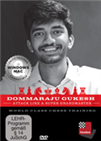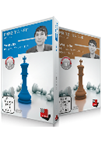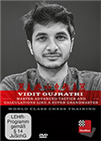The youngest-ever to get an IM norm
Prodigious talents have been making headlines time and again in the last few years. Most of them hail from India, Uzbekistan and the United States, with Iranian-born Alireza Firouzja the biggest star among the youthful bunch. However, none of the top-20 junior players in the world hail from South America. Faustino Oro, a 10-year-old prodigy from Argentina, is likely to change this stat in the coming years.
Known as el pibe de oro (“golden boy”, since oro means gold in Spanish and pibe means boy in Argentine jargon), Oro became the youngest player to ever get an International Master norm back in September. Before that, he had also been the youngest-ever to surpass both the 2200 and the 2300-rating marks.
 In this Fritztrainer: “Attack like a Super GM” with Gukesh we touch upon all aspects of his play, with special emphasis on how you can become a better attacking player.
In this Fritztrainer: “Attack like a Super GM” with Gukesh we touch upon all aspects of his play, with special emphasis on how you can become a better attacking player.Unlike some of his prodigious colleagues, the wunderkind from Argentina did not start playing at 4 or 5. It was only by chance that he began trying his hand at online chess during the pandemic in 2020. He was 7 years old then — at 8, he was already the highest-rated under-10 player in the world!
His father Alejandro, son of chess aficionado Luis, taught him the basic rules. By the time grandpa Luis found out that Faustino was spending more and more time playing online and analysed the boy’s games, it was clear that they were witnessing something extraordinary.
Soon, Faustino joined the traditional Círculo Torre Blanca chess club (established in 1972) and would end up working with Jorge Rosito, an experienced trainer and IM from Mar del Plata. Alejandro was well aware of his son’s intellectual abilities, but was nevertheless flabbergasted by his speedy chess ascent, as he told Diario Sur:
From a very early age, we knew that Fausti was an alert boy. For example, he was able to solve the Rubik’s cube in less than two minutes. Things like that. But we could never have imagined the incredible talent he would surprise us with. His natural genius for understanding the royal game was nothing short of perplexing.
An only child, Faustino is receiving full support from his parents, Romina and Alejando, both professional accountants. The parents are happy to see their kid develop so quickly, but are also cautious regarding the burden they might put on his shoulders. Romina told Carlos Ilardo in an interview for Infobae:
We want to go step by step, we have to see what happens with the changes in age, although for now he is planning to keep focused on chess in the future. We give him a lot of decision-making power, he plays when he feels like it. He still plays football, goes out with friends and likes to watch series and listen to music on the radio. He doesn’t really like reports about him because they make him feel embarrassed.
Alejandro added:
In January he told us that he would like to become a FIDE Master this year, and two tournaments later he had already won the title. That’s why I talk to him a lot, that he doesn’t need to focus on records, that the goal is to improve his game. [...] We are invited from abroad for him to go and play, but he cannot miss three months of school, nor can we neglect our jobs.
 Wesley So published two new opening DVDs: 1.b3, the so called Nimzo-Larsen-Attack, for White and his black secrets in the modern Italian. Get them in a package and save money!
Wesley So published two new opening DVDs: 1.b3, the so called Nimzo-Larsen-Attack, for White and his black secrets in the modern Italian. Get them in a package and save money!
Alejandro, Faustino and Romina | Photo: Infobae
The Messi of chess
A football-crazed country, Argentina recently celebrated the national team’s third World Cup victory. Like Diego Maradona in the 1986 triumphs, they had a resounding hero in Lionel Messi this time around. Considered by many as the greatest of all time, Messi collected 10 Spanish national titles and 3 Champions League titles with Barcelona — not to mention the 8 Ballon d’Ors he received for his individual performances.
Comparing Oro with Messi is, therefore, natural for Argentines. Given the population’s nationalistic pride, the rising star is likely to get plenty of support if he eventually gets to fight for major prizes in the World Championship cycle and in private elite tournaments.
Alan Pichot, the former highest-rated player in Argentina (now representing Spain), had this to say about Oro:
I’m amazed at the flexibility with which he plays the openings. Fausti won’t have much trouble reaching Grandmaster, that's more than obvious. From Grandmaster onwards, a different game begins.
In the latest ranking published by FIDE, the 10-year-old has a 2377 classical rating, after having gained 20.8 Elo points at the Liga Nacional Superior, where he defeated 2527-rated grandmaster Federico Pérez Ponsa with the white pieces.
 The Indian chess grandmaster Vidit Gujrathi with an ELO of over 2700 (June 2023) is one of the best 20 players in the world. For the first time, the sympathetic top player presents himself in a video course. Let a world-class player show you tactical moti
The Indian chess grandmaster Vidit Gujrathi with an ELO of over 2700 (June 2023) is one of the best 20 players in the world. For the first time, the sympathetic top player presents himself in a video course. Let a world-class player show you tactical motiBack in October, he had gained 31.2 Elo points, thanks to his 6½/9 performance at the ITT Copa Ciudad de Comodoro Rivadavia, where he broke Javokhir Sindarov’s record and became the youngest player to ever get an IM norm.

Faustino Oro at the Copa Ciudad de Comodoro Rivadavia | Photo: Tournament site
We are likely to hear much more about this brilliant kid. With so many resources available online and the support of strong trainers in a traditional chess country, el pibe de oro is surely going places!
All available games - Copa Ciudad de Comodoro Rivadavia
Links
























